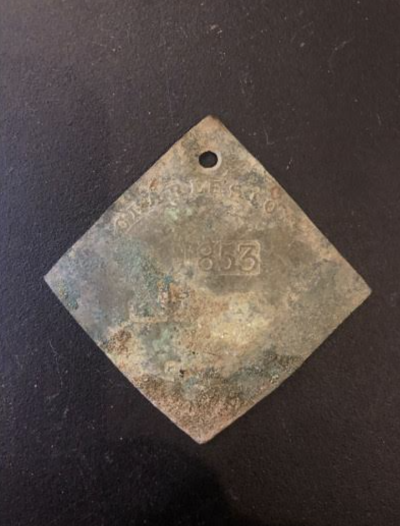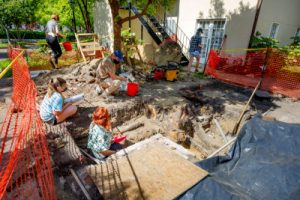College of Charleston faculty, students discover slave badge on campus
June 17, 2021The recent discovery of an 1853 slave badge on the College of Charleston campus has offered a profound opportunity to recognize the contributions of the enslaved people who were an integral part of the development of the institution.
CofC students and faculty discovered the badge labeled “servant” during an excavation earlier this year at a site near Rivers Green where a solar pavilion is under construction. The pavilion project, located near the Phi Kappa Phi Bell Tower, is a federally funded project, which means a cultural resource survey of the site must be conducted before construction.
“Uncovering the slave badge on campus behind a building is significant in multiple ways,” says Bernard E. Powers, professor emeritus of history and director of the College’s Center for the Study of Slavery in Charleston. “This discovery confirms the idea that Black labor was integrally involved in shaping the contours of the land, erecting the city’s buildings and providing the human connections that made Charleston the vital center of production and exchange it became and remains today. This discovery points to the future and shows that there is more to be done and discovered to really appreciate our shared history and heritage; we can use our campus to teach and learn about these things.”
In use from the 18th century to 1865, a slave badge is a small, copper object that served as a permit to work. Each badge was stamped with a date, occupation (fisher, servant, porter etc.) and registration number and was used as proof that the enslaved person’s owner had approved this person to work for someone else. The owner paid a fee to the city, and the city issued the badge. In no other city in the country has such an artifact survived. Many cities had laws, but Charleston appears to be the only place that made a physical badge.
“For those who wore badges were free and not free simultaneously,” writes Harlan Greene, scholar-in-residence in Special Collections, in the introduction to the book, Slave Badges and the Slave-Hire System in Charleston, SC 1783-1885. “Perhaps like no other object that has survived from the time, the badges objectify all the oddness, Gothic horror, and even the human side of slavery.”
Jim Newhard, professor of Classics and director of the College’s Center for Historical Landscapes, has conducted fieldwork in Turkey, Albania and Greece for three decades, but says this excavation on campus was different and more personal, noting “we are working and living on an archaeology site.”
“Holding the slave badge in my hands was moving,” says Newhard. “A real person had this around their neck. It is a clear and present symbol of the past. The site is significant in the larger history that dates back to the pre-Civil War and Reconstruction eras. This is a critical period for understanding the history of the American South and implications to our current society.”
Newhard, along with Jim Ward, senior instructor of historic preservation and community planning, Scott Harris, associate professor of geology, and Grant Gilmore, associate professor and Addlestone Chair in Historic Preservation, were asked to excavate the site. Newhard and Gilmore are registered professional archaeologists, which enabled them to ensure that proper excavation guidelines were followed.
“It’s amazing what we pulled out of those 12 square meters,” says Gilmore. “This is literally the history of the College, and we have a duty to recognize the contributions of the enslaved people of this landscape.”
The findings include artifacts from the 1700-1800s, such as a hearth, animal bones, pottery and the badge.
“The past matters,” says Gilmore. “The decisions we make as stewards will continue to affect our society in impactful ways.”
Harris, who directs the College’s archaeology program, says this experience was a unique opportunity for archaeology students to participate in the excavation of an 1850s kitchen.
“We had about 36 students who immediately signed up to participate in this hands-on experience,” he says, noting that archaeology is a unique interdisciplinary major where more than 10 programs and majors are represented. “Interdisciplinary programs facilitate integrated research experiences that will help students in the job market. This experience was especially meaningful to students after a year of learning virtually.”

Preserving the past is an ongoing effort at the College. Ward has been working with John Morris, vice president of Facilities Management, to involve historic preservation students in the restoration and preservation of the College’s historic campus.
“The idea of getting students involved in learning about our history in a tangible way, working with real problems of keeping these special places viable and helping to develop a deeper historical narrative of our home is a fantastic opportunity,” says Ward. “This has already been a part of our class time, and we hope to expand the program to offer internships for a more concentrated and real-life experience. This is an unparalleled opportunity for our students to expand their understanding and skills — an opportunity that we can all work together on, making our home an example for the city and the field of preservation.”
“I don’t think it’s a coincidence that we found the slave badge. It’s a great opportunity to showcase what the College is doing to actively make changes,” says Charissa Owens, director of diversity education and training in the Office of Institutional Diversity (OID) and producer of the documentary If These Walls Could Talk, a film that examines the history of enslaved Africans who built structures on the College of Charleston campus. “As the 13th oldest college in the U.S. and a former epicenter of slavery, our institution is striving to be a leader in this reckoning. Our ancestors are saying, ‘Hello, we’re here.’ These efforts will speak volumes to our community.”
In advance of Juneteenth, the College of Charleston Alumni Association will host a webinar on Thursday, June 17, 2021, at 7 p.m., entitled “If These Walls Could Talk Showcase and Next Steps.” The webinar will present a panel of faculty and alumni who will share their expertise on the role of enslaved Africans tasked with building the College. The panel will highlight several artifacts, including the recently discovered badge, as well as diversity and inclusion initiatives on campus, such as the new 1967 Legacy Program.
The webinar is free and open to the public. Tickets must be reserved by Tuesday, June 15.
Newhard says this has been an important lesson in how to best protect the College’s cultural resources.
“These artifacts are not just objects of monetary value – they are artifacts that have context and are more valuable when studied and shared,” he says.
Discussions about how the artifacts will be protected and interpreted are underway. An event to honor this discovery and the unveiling of the solar pavilion is being planned for the fall.














